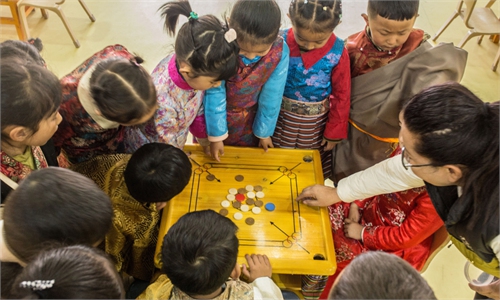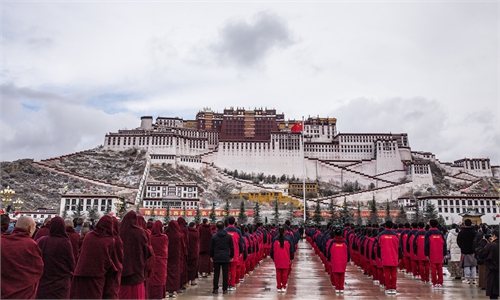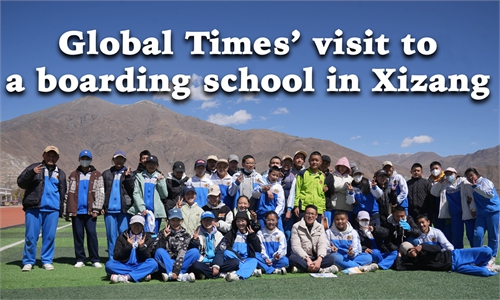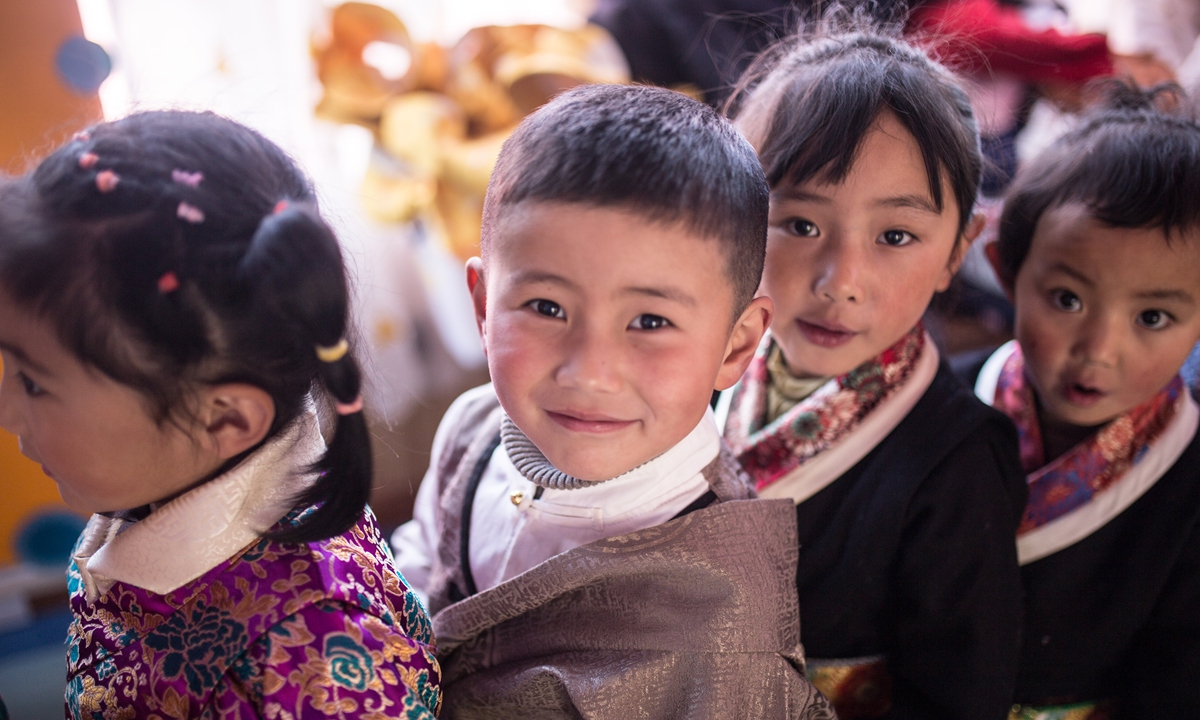
Children wear traditional Tibetan costumes in Lhasa Experiment Kindergarten of Southwest China's Xizang Autonomous Region on March 22, 2023. Photo: Shan Jie/GT
Telling stories in Tibetan, playing traditional board games, learning Tibetan dances, wearing Tibetan costumes… children in the Lhasa Experiment Kindergarten of Southwest China's Xizang Autonomous Region fully enjoy their days while embracing local traditional cultures.
Not far from the kindergarten, in the classrooms of the No.1 Primary School in Lhasa, second graders learn how to read and write Tibetan words. For them, learning Tibetan is as important as learning Putonghua.
In the Xizang education system, it has always been important for students of Tibetan ethnicity to learn and grasp the local language systematically.
While visiting a kindergarten and schools recently, the Global Times found the principle being well implemented - all the children of Tibetan ethnicity the reporters met in Lhasa are able to express themselves in both Putonghua and Tibetan.
After enrolling in kindergartens, children from Tibetan ethnic groups are immersed in a systematic language acquisition environment in school.
Moreover, many hobby groups in schools or afterschool programs allow children to fully apply their talents and learn about traditional culture, such as how to master local instruments or how to perform Tibetan opera.
In Xizang kindergartens, the majority of the children are of Tibetan ethnicity, so the teachers engage in bilingual communication with children.
"We do not restrict language use among the children in the kindergarten, but we encourage them to speak complete sentences in a single language, so that they do not confuse themselves by mixing languages," Mima Zhuoma, a grade director at the Lhasa Experiment Kindergarten, told the Global Times.
According to Zhuoma, most children comprehend both languages in a short time after they enter kindergarten, regardless of their language background.
In schools, most students choose to take Tibetan as a compulsory course, just as Putonghua and mathematics. Many schools also provide basic Tibetan language courses for the rest of the students who do not have a similar language background.
In the No.1 Primary School of Lhasa, some first graders of Han ethnicity or of other ethnic groups also have Tibetan language lessons, learning how to use easy phrases such as "Good morning teacher." In the last semester, they started learning how to read and write Tibetan script.
For instance, middle schools students have seven class hours allotted to the learning of the Tibetan language, which is the same as other major subjects such as Putonghua and mathematics.
According to Luosang Yundan, the executive vice-principal of the Lhasa No. 1 Primary School, the development of bilingual education has undoubtedly broadened the path for students to harness their talents. "Bilingual teaching can improve children's literacy and give them more options in their future life path," Luosang Yundan told the Global Times. "Tibetan is needed to study Tibetan medicine, Tibetan literature, Tibetan history and other subject areas in which Tibetan literacy is imperative."
In the high school and the college entrance exams, which are the most important exams for Chinese students, the Tibetan language test is also of great importance. Taking the high school entrance exam as an example, Tibetan and Putonghua each account for 75 points.
"Learning and using the national language is a common practice in all countries in the world, which is conducive to inter-ethnic information exchange and solidarity," Zhaluo, head of the social economy institute of China Tibetology Research Center, said. "Tibetan is a social communication language widely used in farming and pastoral areas in Xizang. Therefore, bilingual education is in line with Xizang's actual condition," he said.
"Actually, the system of Tibetan language education in Xizang is comprehensive and ranges from preschool education to the doctoral level. It can be said with certainty that the number of people in Xizang who have mastered the Tibetan language is higher than at any other time in history, and the enrollment rate of primary and secondary schools in the region has almost reached 100 percent," Zaluo said.
In addition to their studies, schools in Xizang also provide students with various activities. In their spare time, students participate in cultural and sports activities including traditional Tibetan singing and dancing, the playing of musical instruments, performing Tibetan opera, and painting, so that students can better understand and learn Tibetan traditional culture. Some of them end up choose art as a professional path in adulthood.
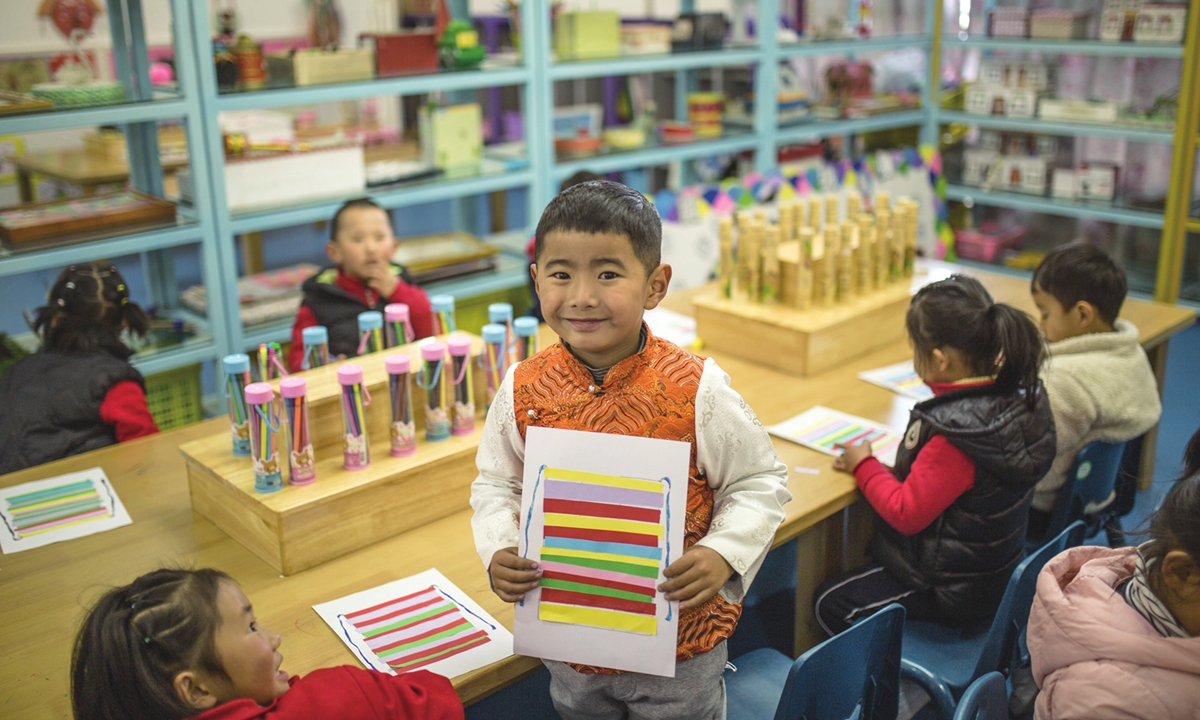
A boy shows the bangdian, or Tibetan apron, he just colored at a workshop in Lhasa Experiment Kindergarten on March 22, 2023. Photo: Shan Jie/GT
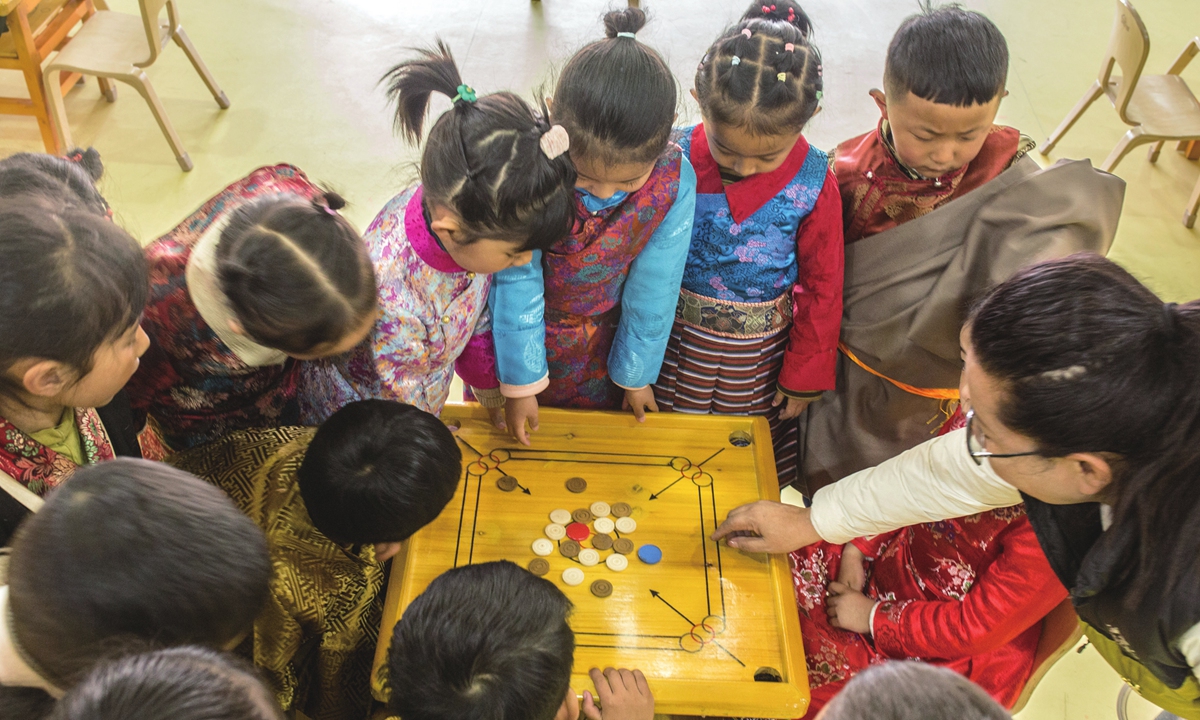
A teacher shows children how to play Kelang Ball game, known as Tibetan Snooker, in Lhasa Experiment Kindergarten on March 22, 2023. Photo: Shan Jie/GT
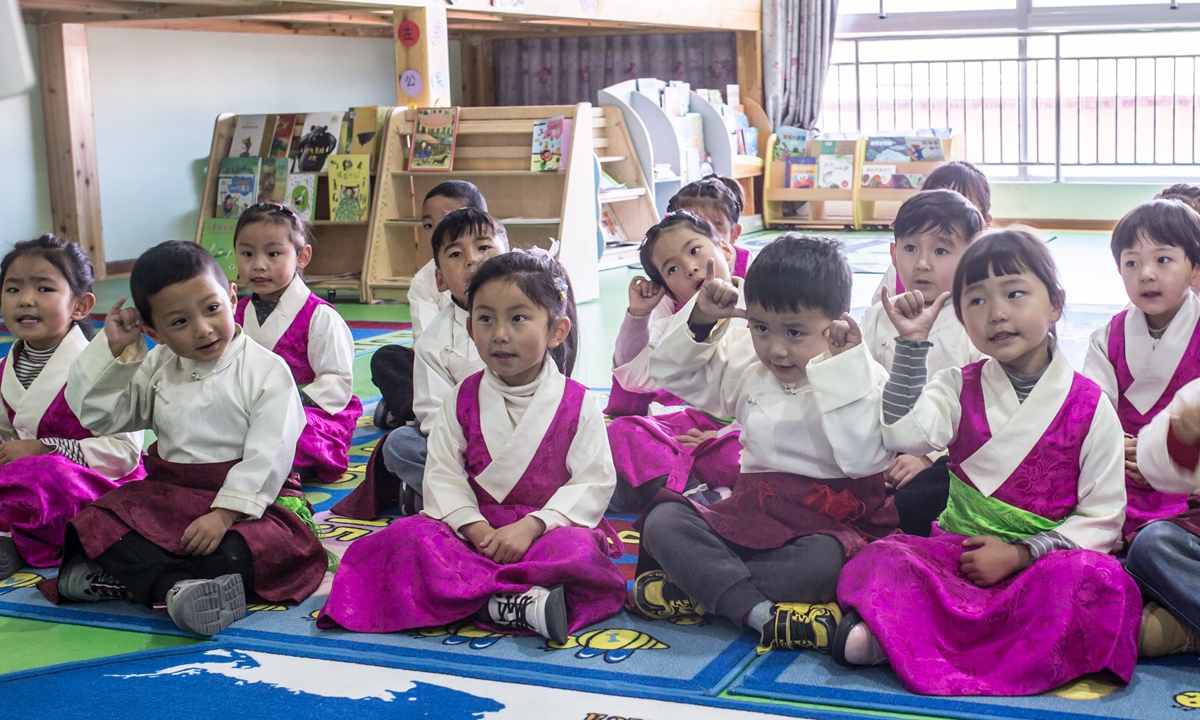
Children follow the teacher to read a story book in Tibetan language in Lhasa Experiment Kindergarten on March 22, 2023. Photo: Shan Jie/GT
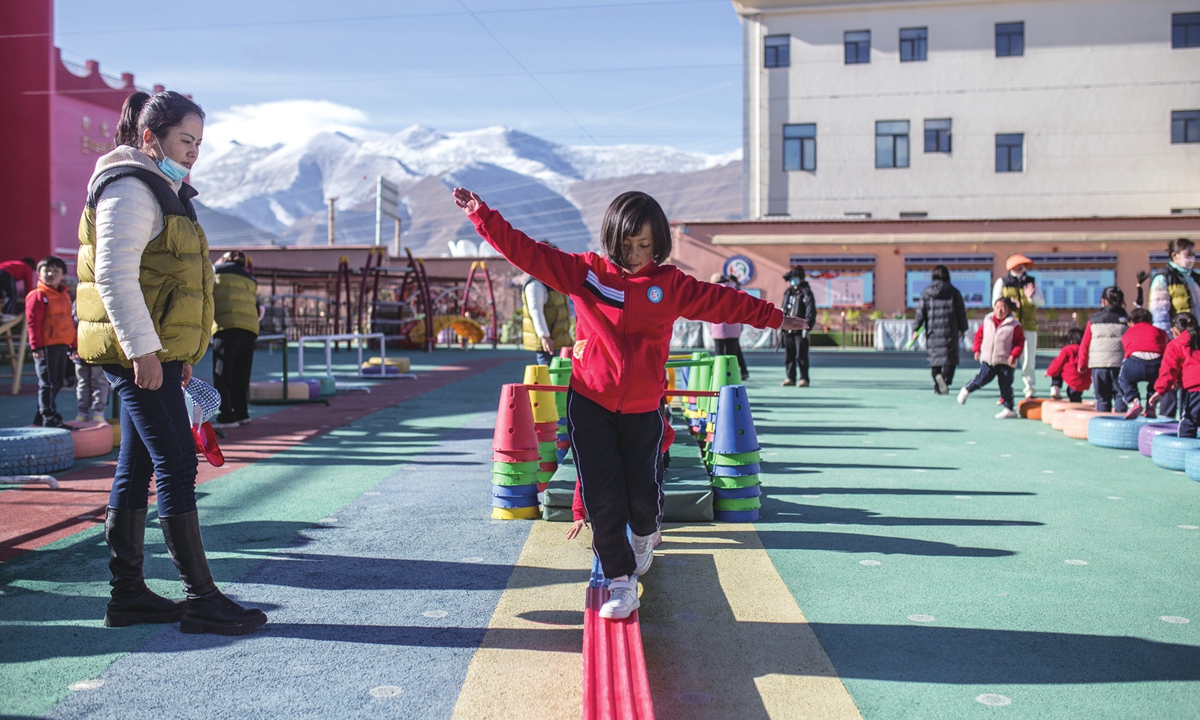
A child plays on the playground of Lhasa Experiment Kindergarten on March 22, 2023. Photo: Shan Jie/GT
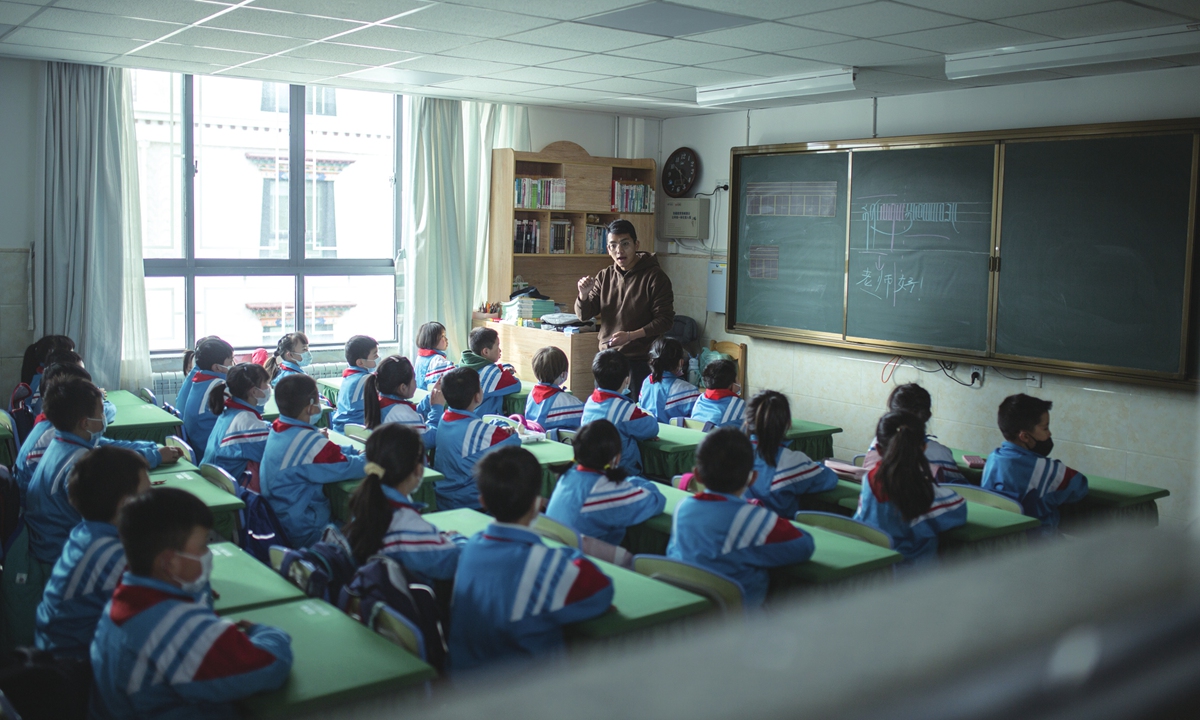
Danzeng Jinlai, a teacher at No.1 Primary School in Lhasa, gives a lesson of Tibetan language on March 21, 2023. Photo: Shan Jie/GT


